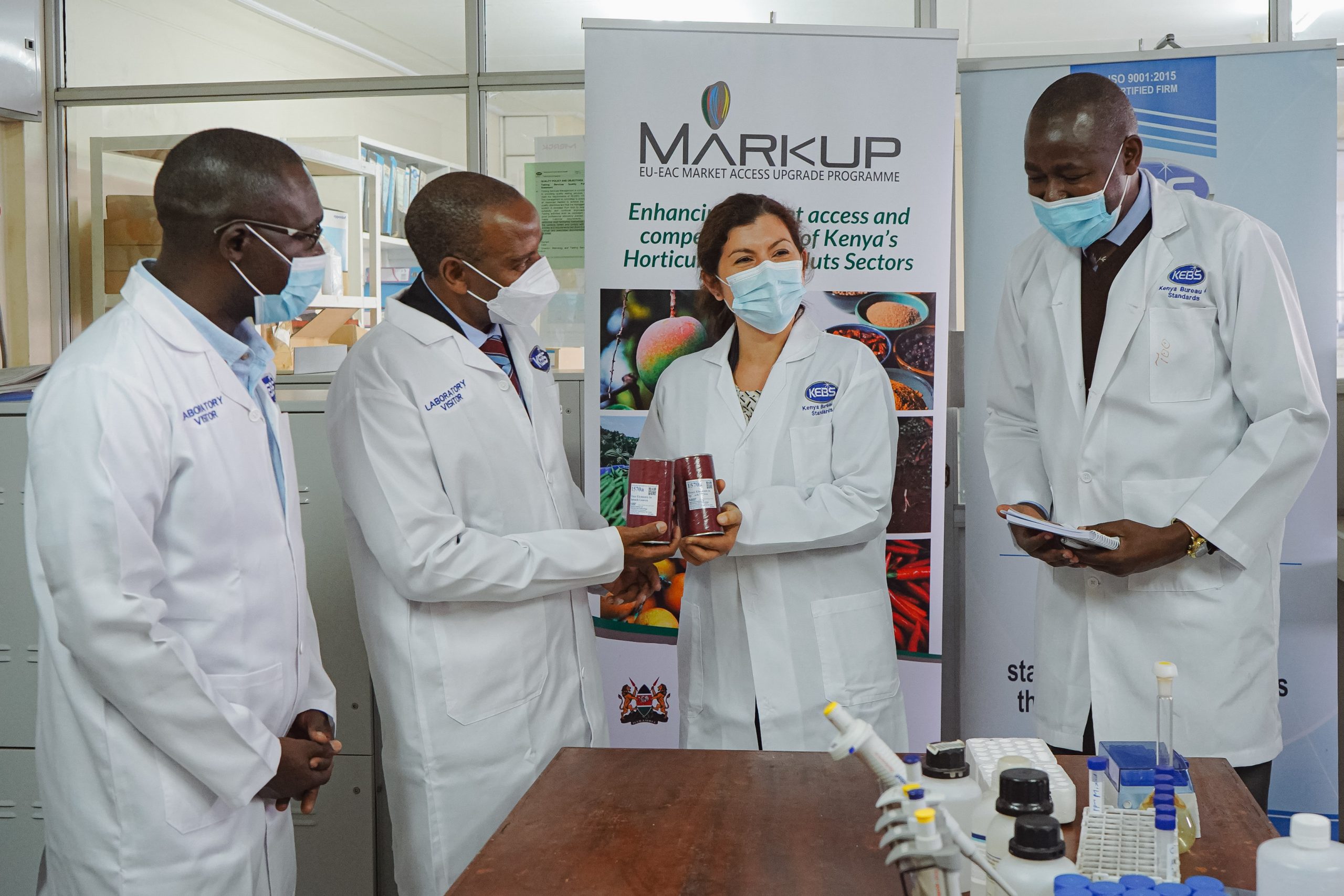World Standards Day: EU funded MARKUP supports KEBS with Certified Reference Materials

As the World Standards day is marked today, the Kenya Bureau of Standards (KEBS) has received Certified Reference Materials (CRMs) in a bid to enhance quality control in analytical laboratory tests.
The World Standards Day is marked on October 14 annually as a way to pay tribute to collaborative efforts by experts globally who participate in development of voluntary technical agreements which are published as International Standards.
On Tuesday 12th October, the European Union handed over CRMs to KEBS as a way of supporting the institution’s bid to ensure food safety for both local and international markets.
The European Union Ambassador to Kenya, H. E Henriette Geiger, said: “These CRMs are part of a long term support to KEBS. The European Union is the biggest market for Kenya’s horticultural produce. Improving quality and safety standards assures a continued access to the European markets as well as quality produce for local consumption. We look forward to a continuation of this partnership, which also strengthens Kenya’s capacity to participate in regional and international trade.”
KEBS Managing Director Lt. Col. (Rtd) Bernard Njiraini hailed the relationship between the institution and EU, saying the two had come a long way through projects that have left an indelible mark in the Kenyan economy and fostered trade between Kenya and the European Union.
“Our partnership has enabled us develop standards and codes of practice related to plant and animal based products, upgrade our laboratories and update and maintain a risk based residue and contaminant monitoring plan,” said Njiraini. “As an organization, we are excited to be in partnership with you once again in the Market Access Upgrade Program that seeks to support increased exports of agribusiness and horticultural products, promote regional integration as well as access to European markets for Kenya as well as the whole of East Africa,” he added.
Ms. Myra Bernardi, Head of Agriculture, Job Creation & Resilience Section at the European Union Delegation to Kenya acknowledged the fact that reference materials are particularly important for analytical chemistry and clinical analysis. “We are indeed happy to have supported the provision of CRMs to laboratories in Kenya particularly at KEBS and in future those at Kenya Plant Health Inspectorate Services (KEPHIS),” said Myra.

The CRMs were provided through the Market Access Upgrade Program (MARKUP) Kenya, which is funded by the EU ad implemented by the United Nations Industrial Development Organisation (UNIDO) in partnership with the government and private sector.
Acting Chief Manager for Testing Services at KEBS Tom Okumu described CRMs as highly characterize products with known qualities or properties. It is these properties he added that help in assuring the quality of results received from the laboratories.
The CRMS are used for quality control in analytical testing laboratories to demonstrate and give assurance on reliability and accuracy of test results released by laboratories in the various samples tested.
Among CRMS that KEBS received from EU through MARKUP Kenya include elemental analysis which are used to test minerals like sodium, zinc, iron and others that the body requires on a daily basis.
Others are CRMs covering toxic metal contaminants use for testing metals such as mercury which have to be extremely low levels if they have to.
KEBS also received CRMS for micotoxins also known as aflatoxins which are used to validate presence of toxic stuff, according to Okumu.
“The availability of these reference materials has supported KEBS initiatives in development of reference materials and assignment of values to proficiency testing samples distributed locally and in the EAC hence strengthening KEBS testing laboratories as the National Reference Laboratory for Conformity for locally imported and imported goods traded in Kenya and beyond,” said Okumu

Among key interventions that MARKUP Kenya hopes to achieve is creating awareness on aflatoxin contamination and prevention especially for macadamia, groundnuts and dried herbs and spices.
MARKUP Kenya National Project Coordinator Maina Karuiru emphasized on the need for production of quality food safe from contaminants such as chemicals, microbial and pesticides residues.
The program, he added, is keen on training farmers on issues such as GAP and other standards and certifications as required so that Kenyan produce can get more markets locally, regionally and internationally with a bias to the EU.
